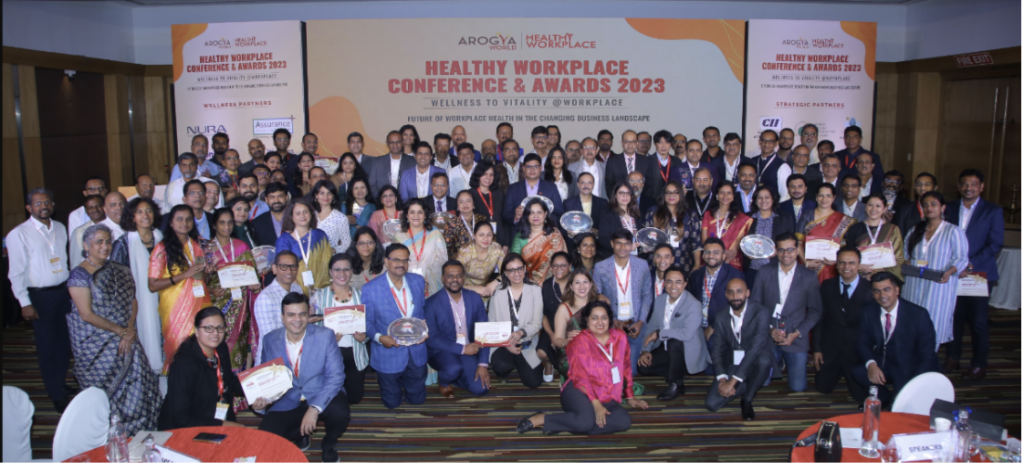
In the ever-evolving global #business landscape, the #World Health Organisation (WHO) has warned of the severe impact of NCDs and mental health challenges on the workforce. With a staggering annual loss of 12 billion working days attributed to depression and anxiety, the productivity loss amounts to $1 trillion, thereby urging organizations to prioritize their employees’ well-being. The good news is – employers are increasingly recognizing that employee well-being is a critical component of business success and are actively reshaping their strategies to place growing emphasis on fostering their health and vitality.
Industry stalwarts and thought leaders convened at the 11th edition of the Arogya World Healthy Workplace Conference & Awards 2023, to discuss and deliberate on diabetes prevention and other non-communicable diseases, to delve into the theme of “Wellness to Vitality @ Workplace: Future of Workplace Health in the Challenging Business Landscape.” Discussions explored a multifaceted approach to workplace wellness, covering topics ranging from artificial intelligence (AI) integration and mental health support to ESG investing and the silent epidemic of obesity.
Dr Nalini Saligram, Founder and CEO of Arogya World, said: “We came up with this healthy workplace program because workplaces are where we find people who are younger than 30 years old, where we can freely change the trajectory in their lives.” She emphasized the importance of preventive measures, including proper nutrition, exercise, and tobacco avoidance, while highlighting workplaces as crucial arenas for influencing lives due to the significant time individuals spend in these environments.
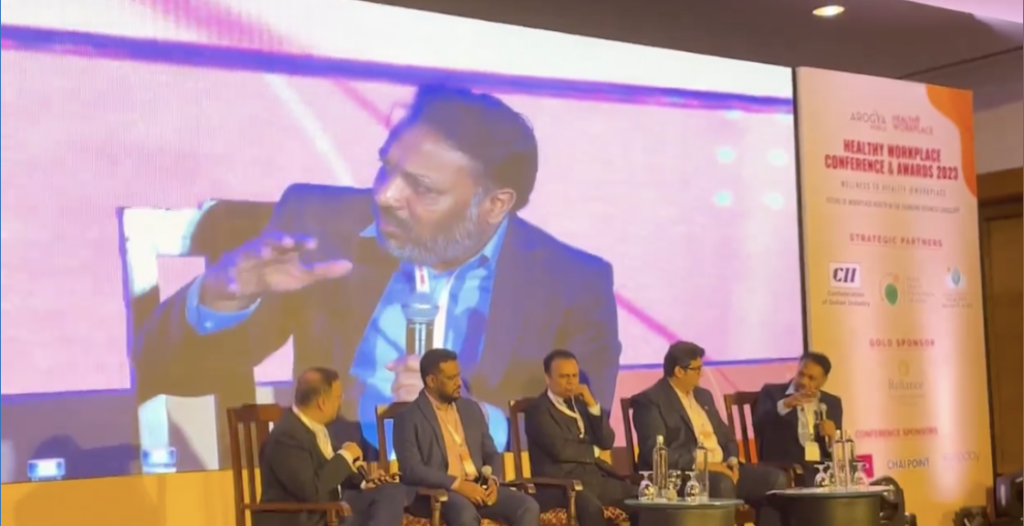
Multiple discussions and takeaways
The panel discussion explored the intersection of work, workplace, and workforce in creating comprehensive wellness programs, and the importance of a holistic approach from evolving wellness metrics and financial well-being to the role of leadership in driving health initiatives.
“Evolve wellness programmes over time and measure outcomes,” said Karan Verma: CEO Bridge Health Medical and Digital Solutions advocating for a corporate dashboard and population health matrix.
“Financial well-being is linked to mental well-being. Organisations need to focus on financial education to prevent fut
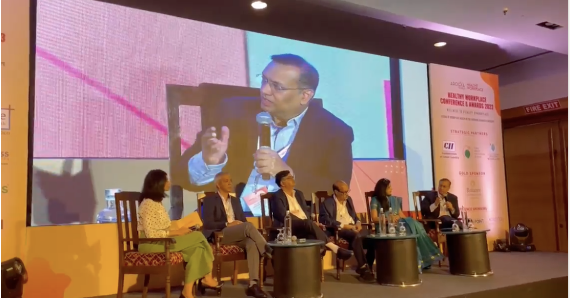
ure crises for the youngsters,” added Anderson Philips, Head of Site GSC Kolkata and GSC India CAO @ HSBC Electronic Data Processing India Private Limited. He reinforced the need for a hybrid workplace for a balance of social connection and flexibility.
Saurabh Jain, Vice President of Global Delivery Centers, Enterprise Contact Center and Corporate CSR Initiatives, Indegene identified work, workplace, and workforce as the three pillars of workplace health as he called for streamlining work, creating a conducive workplace, and focussing on mental well-being.
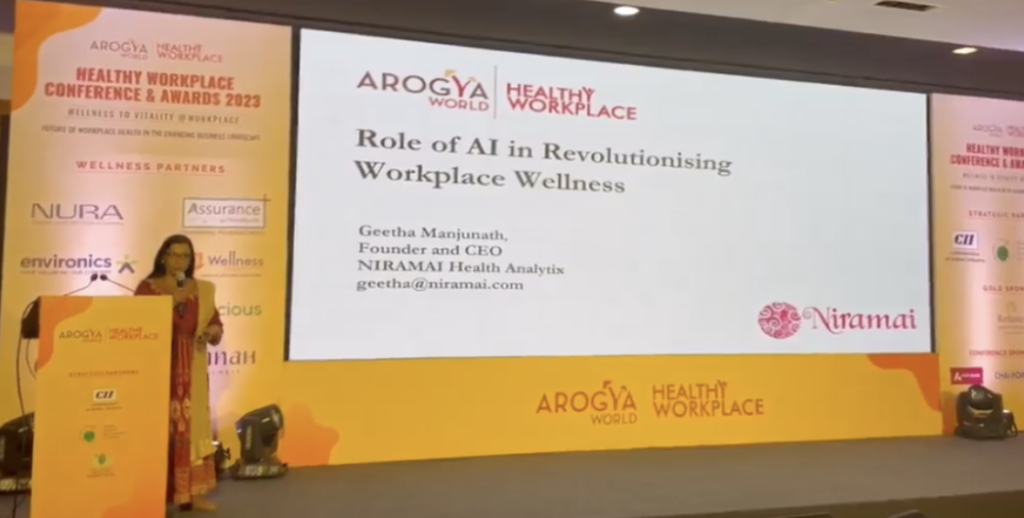
In a session on the revolutionary impact of AI on workplace wellness, Dr Geetha Manjunath, CEO and Founder of Niramai Health Analytix, dwelt on how the integration of AI is revolutionizing the process with “multifaceted applications in workplace health, from productivity tools to stress detection and health monitoring” contributing to a more efficient, informed, and healthier workforce.
A blueprint for impactful employee well-being practices, presented by Ashwani Prashara, Chief Human Resource Officer at Reliance Industries Limited, outlined the need for a mindset shift, from traditional perks to purpose-driven approaches, where well-being initiatives can be aligned with the evolving paradigms of flexible workplaces, digital transformation, and equity focus.
Moderated by Mohana M D, Chief People and culture Officer at BetterPlace, the panel discussion provided insights into the evolving paradigms of institutional policies, micro-practices, stakeholder engagement, and the critical role of well-being officers. Salil Lal, Chief Human Resources Officer at Maruti Suzuki India Ltd, said: “The first and primary motive of an organization is to become stronger, which means the bottom line has to do better. People’s productivity and efficiency have to increase.”
KS Harish, Country Group HR Head at Bayer Group, stressed the importance of micro-practices. “What is important today is micro-practices, something you can do daily in meetings. Focus less on the measure but more on the measure.”
Suma PN, Director – Human Resources at Otis India, delved into stakeholder roles, as well as the importance of defining a well-being culture. “How are we able to bring all the stakeholders on board, starting with people managers? How, as colleagues, can we take care of each other?” Dr. R Rajesh, Group Head – Medical Services at Reliance Industries Limited, said: “Post-Covid, each organization must have a well-being policy”. Rahul Kalia, Head – Health, Wellness & Medical Services at Bosch Limited, provided a dual perspective, examining the organizational and employee standpoints. He advocated targeted programs based on organizational vision, emphasizing the shift from Return on Investment (ROI) to Value on Investment (VOI).
Greg S Garrett, Executive Director of the Access to Nutrition Initiative, underlined the critical importance of nutritious diets in combating global diseases, explored challenges and opportunities in processed foods, and advocated for responsible investing to encourage businesses to prioritize healthier product portfolios. He cited findings of the India Index 2023 product profile assessment, revealing that 76% of sales in India are derived from less healthy products and the significant opportunities this indicated.
Dr Ashwin Naik, Founder of Mannah Wellness, and Dr. Shyam K Bhat, Psychiatrist, Psychotherapist, and integrative Medicine Specialist, delved into the challenges of achieving happiness in a world driven by materialism and the constant pursuit of success. Dr. Bhat explored the profound question of why humans, unlike other species, suffer from mental health issues, attributing this to the evolution of the human mind, which, while providing the capacity for complex thoughts and communication, also leads to suffering by pulling individuals away from the present.
The panel, comprising Saligram along with Dr Divyang Doshi, Chief Medical Officer at Godrej Group and Dr Arun Kale, General Manager- Corporate Health and Wellness, Tata Motors addressed the rising issue of obesity in the workplace. They discussed trends, economic impacts, occupational causes, and wellness strategies. World Bank reports indicate that 18% of adults in India are overweight, with 6% classified as obese. Dr Kale highlighted the economic impact, accounting for $17 per capita, constituting 0.8% of the Indian GDP, and the need for prevention through lifestyle changes.
While Arogya is leading the conversation, we request you all collaborate with us.
- Click here to nominate your organization for Healthy Workplace Awards 2023
- Click here to learn more about Healthy Workplaces 2023 winners
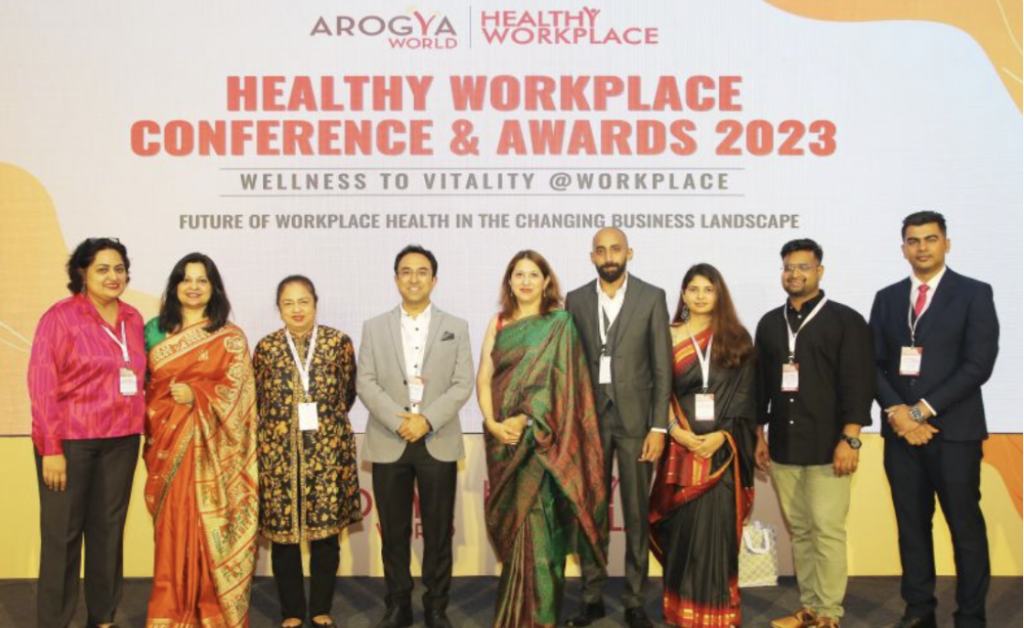
This brilliant, exceptionally talented, passionate team, can make the impossible happen. Thank you, Dr Nalini Saligram, Srabani Banerjee, Usha Chander, Nandan Bhatia, Ashwini Thakker, Navin Ram Mohan, Manikanta A, Anuradha Yadav, Himanshu Mandal and Kriti Pradhan for delivering an exceptional conference that was a resounding success!
